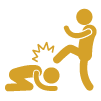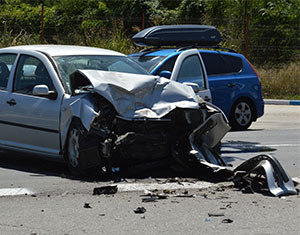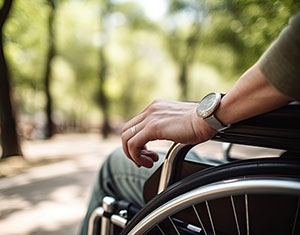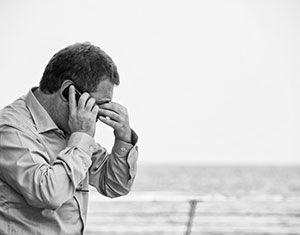What is a Paralysis Injury Case in Georgia?
Paraplegic and quadriplegic paralysis are injuries that involve damage to the central nervous system in the spinal cord. When the spinal column is damaged, the impact is devastating, and often permanent. Stephen D. Apolinsky and our Atlanta paralysis injury attorneys have successfully delivered compensation for individuals who’ve suffered serious, debilitating and lifelong injuries.
Spinal cord injuries and other injuries that lead to paraplegia, quadriplegia, and paralysis are some of the most serious injuries you can suffer in an accident. These injuries are usually permanent, requiring thousands of dollars in lifetime medical care.
Any accident that causes damage to the spinal cord can cause partial or complete paralysis. Some of these injuries can heal, but others will mean permanent disability from one of two forms of paralysis, depending on the location of the injury:
- Paraplegia, where the person has a lower-back spinal cord injury that results in leg paralysis. They still have the use of the arms and upper torso, and sometimes parts of the legs.
- Quadriplegia, where the person’s injury is in the upper part of the back or the neck, causing paralysis of the arms, legs, and torso. In some cases, the person also has no ability to move the head or neck.
The closer the injury is to the brain, the more significant the injury. For those whose injuries impact the spinal cord or the brain, they may have permanent, long-term paralysis. This is considered a catastrophic injury.
At Apolinsky & Associates, LLC, we recognize the ways in which a paralysis injury can completely upend your life, and our attorneys will advocate on your behalf to ensure you are fairly compensated for your injuries.
Long Term Impacts of Paralysis Injuries Due to Negligence
The initial injuries are just the beginning of a paralyzed person’s journey. Those who do not walk again will see their mobility severely restricted, leading to modifications to their home and vehicle. For instance, if a person lives in a multiple-story home, they will need an elevator to be able to access the upper floors.
A patient with paralysis must also learn how to live with their new normal, including:
- Employment
- Driving
- Personal care
- Cooking and cleaning
- Personal affairs such as bill paying and grocery shopping
- Using a phone, computer, and other devices
- Exercise and movement
Many patients will require assistance to continue living independently after an accident resulting in paraplegia/quadriplegia. With assistance, paralysis patients can continue to live a full life despite their injuries.
If you or a loved one have suffered paraplegia/quadriplegia injuries in Georgia and would like to know what damages you may recover as part of your case, contact Apolinsky & Associates, LLC, for a free case evaluation.
Further Reading: Understanding Negligence Per Se in Personal Injury Cases
Proving Negligence & Causation in Paralysis Injury Cases in Georgia
On top of the emotional and financial impact that comes with sustaining a paraplegic or quadriplegic injury, victims who suffered their injury due to the negligence of another have to contend with a complicated legal system in order to obtain justice and be made whole.
When someone else’s negligence results in an injury, it’s up to the plaintiff (and their attorney) to prove this to the court. Georgia law has four requirements for proving negligence by a defendant:
- The defendant had a duty of care to act in a way that avoided or prevented harm to another person
- The defendant willfully or intentionally breached that duty of care, leading to an accident
- The defendant’s actions, or lack of action, led to the action that caused the plaintiff’s injuries
- The plaintiff suffered damages (financial losses) as the result of the accident that the defendant caused
All four elements must be shown to establish the defendant’s negligence.
Proving negligence is only the first step to obtaining full compensation for injuries suffered. Unfortunately, in far too many cases, victims of paraplegia/quadriplegia caused by negligence are offered far less compensation than they deserve. At Apolinsky & Associates, LLC, our team of dedicated Atlanta injury lawyers can help guide you through the process of gaining compensation.
Compensation & Damages Recoverable in Paralysis Injury Cases
As you can see, a paraplegia/quadriplegia injury is a difficult, painful, and expensive injury. Whether you’re temporarily out of work or permanently disabled, you’ll need help. After an accident caused by someone else’s negligence, you deserve compensation to help you heal and recover.
The amount you recover will depend on several factors, including:
- Continuing medical treatment, including therapy
- How the accident impacts their career and working life
- How the accident impacts their mental and emotional health
- How the accident impacts their quality of life
- Initial treatment after the accident
- Lost work time
- The limits of the defendant’s insurance policy
With this in mind, we can pursue damages for:
- Medical expenses, current and future
- Property damage
- Lost wages, current and future
- Lost benefits
- Loss of future earning ability
- Disability/permanent impairment
- Emotional anguish
- Pain and suffering
- Loss of enjoyment of life
- Loss of consortium (for married couples)
Sometimes a person doesn’t survive their paraplegic/quadriplegic injuries. For someone who lost a family member after such an injury, they may be able to file a wrongful death lawsuit to recover damages such as:
- Final expenses, such as funeral and burial costs
- Medical expenses related to the accident until the time of death
- Loss of inheritance
- Loss of consortium
Insurance companies are unconcerned about your needs. They go to great lengths to deny your claim, minimize any payout, and convince you that you will not receive anything. In fact, many adjusters will tell you that you don’t have a case, or that you don’t have the right to an attorney. You do, and we suggest that you speak with us—and no one else—as soon as possible following your accident.
You have just two years from the date of the accident to file a claim. The sooner you speak with our personal injury attorneys, the more time we have to gather evidence to investigate your claim. We will handle all negotiations on your behalf, so refer all calls to our office. Don’t speak to anyone yourself. Otherwise, you could lose thousands of dollars in compensation you need to take care of yourself and your family.
Further Reading: What is Pain and Suffering and How Is Compensation Value Calculated?


















